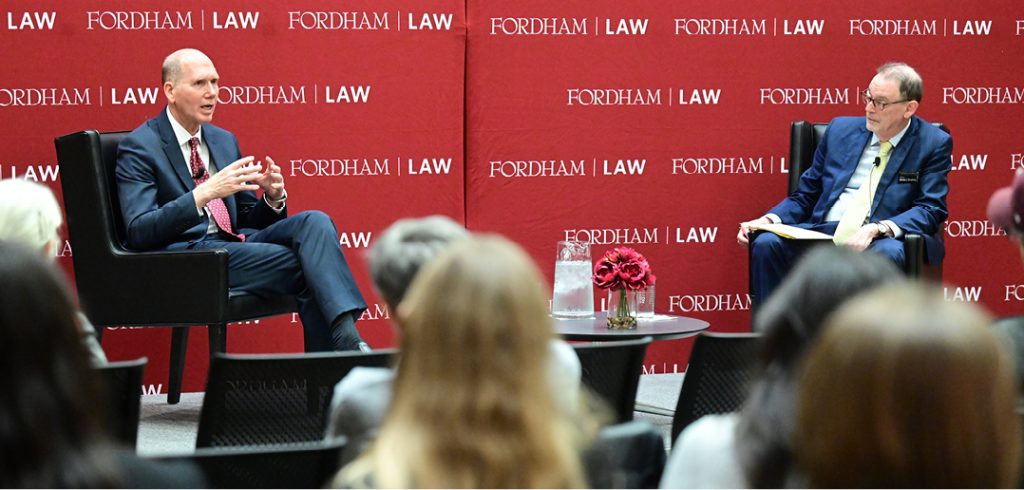In February, the Center for Judicial Events & Clerkships (CJEC) welcomed Judge Kent Jordan of the U.S. Court of Appeals for the Third Circuit as its 2024 Distinguished Jurist in Residence. The centerpiece of Jordan’s visit was his lecture, which made the case for addressing contentious issues through respectful dialogue and civil discourse.
“No matter how fraught the problem is, no matter what your politics may be, there are better and worse ways of addressing it,” he said.
“The endeavor of our profession, which ought to be equal justice under law, will be aided and greater success will be assured if we can share at least this one motivation—a sincere desire to actually reason about and, where possible, through our differences,” said Jordan. “Whether you came to law school with the goal of being a great trial attorney, skilled dealmaker, public policy expert, effective political operative, or profound constitutional scholar, we are in the business of reconciling competing interests.”
Jordan’s visit in late February was a part of the Distinguished Jurist in Residence Program, an initiative of the CJEC that brings prominent judges from across the country to the Law School. Visiting jurists engage with the Law School community, share their expertise, and present a lecture on a timely and important legal topic, which is subsequently published in the Fordham Law Review.
During the course of his day-long visit at the Law School, Jordan immersed himself in the life of the Law School. He co-taught a corporations class with Professor Martin Gelter and an evening evidence class with Professor Daniel J. Capra, had breakfast with members of the Law School’s chapters of the American Constitution Society and Federalist Society, an informal lunch with members of the Moot Court Board and Brendan Moore Trial Advocates, and discussed the latest legal developments with faculty members.
Judge Jordan’s lecture, titled “Come Now, Let Us Reason Together,” explored a number of topics, including the importance of respectful engagement, meaningful dialogue, and open debate and persuasion in law and politics.
He recalled Abraham Lincoln, who he called the “ideal model of commitment to reasoned debate in the face of intense divisions over law and public policy.” As an example, Jordan noted Lincoln’s anti-slavery Peoria Speech, delivered in 1854, and his response to Senator Stephen A. Douglas’ defense of the Dred Scott decision in 1857. Jordan urged the audience to consider how Lincoln also stood in the audience while Douglas spoke, listening attentively and respectfully to his adversary before later delivering his own powerful responses that met, rather than avoided, Douglas’ arguments.
“That is the essence of a civil society, and I hope you never tire of your commitment to building and maintaining ours, wherever life takes you,” Jordan said.
Sadie LoGerfo-Olsen ’24, editor-in-chief of the Brendan Moore Trial Advocacy Center, attended both the informal lunch and the lecture and reflected, “In addressing the current state of polarization, and calling for us to listen to one another, Judge Jordan centered patience and opportunity—to offer both to others from differing backgrounds and hopefully find a middle way forward. In sum, Judge Jordan provided a refreshing reminder of how we should all carry ourselves in an inherently adversarial profession and in an incredibly divisive country: to put aside our assumptions and extend a genuinely open ear.”
Student Bar Association President Josh Cockream ’24 added, “Resiliency. That is the primary thing I took away from Judge Jordan’s address. He reminded us that while engaging in debate can be fraught, it is crucial that, as future lawyers and advocates, we not let our emotional or intellectual discomfort cloud our ability to use sound reason to persuade the other side.”
“While Judge Jordan’s visit was a single day, he was tireless in engaging with our community and made a lasting impact,” said CJEC Assistant Dean Suzanne M. Endrizzi ’96. “We are grateful for his generosity.”
“Judge Jordan’s lecture shared an important message about the need for civil discourse, both within our law schools and in the larger public arena,” added Professor James Brudney, Joseph Crowley Chair in Labor and Employment Law and CJEC faculty director. “In addition, students and faculty greatly appreciated the judge’s generous interactions with members of our Law School community during his day in residence.”
Since March 2020, CJEC has welcomed the following judiciary members as its Jurists in Residence: Judges Jeffrey Sutton, Amy St. Eve, Solomon Oliver Jr., Stephen Higginson, and Bernice Donald (ret.). In February 2025 CJEC will welcome Judge J. Michelle Childs, U.S. Court of Appeals for the D.C. Circuit. Visit CJEC’s FLASH page for transcripts of past Distinguished Jurist in Residence lectures.
View scenes from the visit below:

